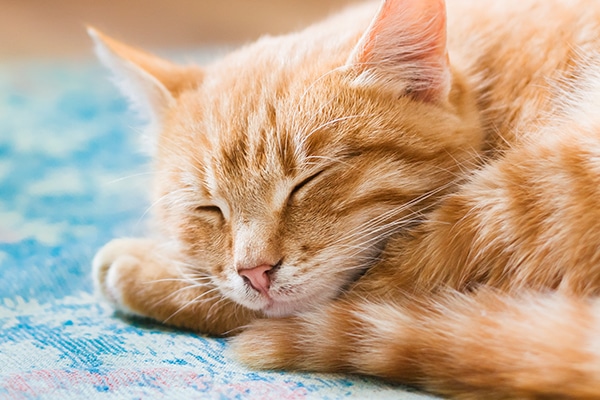Why Do Cats Sleep So Much? 5 Facts About Sleeping Cats
The post Why Do Cats Sleep So Much? 5 Facts About Sleeping Cats by JaneA Kelley appeared first on Catster. Copying over entire articles infringes on copyright laws. You may not be aware of it, but all of these articles were assigned, contracted and paid for, so they aren't considered public domain. However, we appreciate that you like the article and would love it if you continued sharing just the first paragraph of an article, then linking out to the rest of the piece on Catster.com.
Why do cats sleep so much? Our feline friends are true masters at falling asleep any time, any place, under any circumstances. Even a cursory web search will reveal thousands of photos of sleeping cats in cute or crazy positions. But why do cats sleep so much, and what happens in their minds when they’re sleeping? Do they have sleep cycles like people do? Read on to find out more about sleeping cats.
1. All that sleeping is in your cat’s genes

An orange tabby cat sleeping with his eyes closed. Photography ©Ryhor Bruyeu | iStock / Getty Images Plus.
When answering the question, “Why do cats sleep so much?” let’s first look at how long cats sleep. Cats can sleep as much as 16 hours a day, and older cats spend even more time at rest — as much as 20 hours a day. That sleeping habit is a result of the cat’s evolution, nutritional habits and physiology. In the wild, cats have to hunt in order to eat, and the stalking, chasing and killing of prey burns a lot of energy. Sleeping helps cats conserve energy between meals.
2. Cats aren’t always sound asleep
Another thing to consider when thinking, “Why do cats sleep so much?” is how they sleep. Of the time cats spend sleeping, about three quarters of it is what we might call snoozing. In that state, cats can get all the rest they need, but they’re still alert enough to awaken at a moment’s notice. You can tell when a cat is in light sleep because their ears will twitch and rotate toward noises and their eyes will be open a tiny bit. Even when they’re sitting upright, cats can slip into that dozing mode.
3. Cats do, however, sleep deeply and even dream
The remaining quarter of cats’ sleeping hours is spent in deep sleep, but older cats might spend as much as 30 percent or 40 percent of the time at that level. Cats in deep sleep are usually curled up with their eyes tightly closed. Sometimes, they might even have their tail over their face, like a fluffy sleep mask. Deep sleep is critical for the body’s ability to regenerate itself and stay healthy. It’s also the time when your cat dreams. If you’ve seen your cat’s whiskers or paws twitching while she’s asleep, there’s a good chance she’s dreaming.
4. Some cats do snore when they sleep
Cat snoring happens when the airway is obstructed by extra skin from the soft palate. This is most likely to happen when your cat is relaxed, so it wouldn’t be outrageous to notice your cat sawing some tiny little logs from time to time. Snoring is more likely to occur in short-nosed or brachycephalic cat breeds such as the Persian, Himalayan or Exotic Shorthair.
5. A change in your cat’s sleeping habits could be a sign of trouble
When asking, “Why do cats sleep so much?” you might also wonder if there’s some such thing as too much — or too little — sleep. If your cat starts sleeping a lot more or a lot less than usual, contact your veterinarian. Excessive sleep could be a sign of illness or pain, while frequent wakefulness can indicate a problem such as hyperthyroidism.
Tell us: Do your cats have any odd — or cute — sleeping behaviors? Please share them in the comments!
Having trouble sleeping, unlike your cat? Here’s how to beat insomnia >>
Thumbnail: Photography by 3sbworld/Thinkstock.
This piece was originally published in 2017.
Read more about sleeping cats on Catster.com:
- Sleeping With Cats: Yay or Nay?
- Is Your Cat Sleeping Too Much — or Not Enough?
- 5 Parts of My Cats I Can Touch Only While They Sleep
The post Why Do Cats Sleep So Much? 5 Facts About Sleeping Cats by JaneA Kelley appeared first on Catster. Copying over entire articles infringes on copyright laws. You may not be aware of it, but all of these articles were assigned, contracted and paid for, so they aren't considered public domain. However, we appreciate that you like the article and would love it if you continued sharing just the first paragraph of an article, then linking out to the rest of the piece on Catster.com.




Post a Comment